Posted 2 years ago
Sun 26 Nov, 2023 12:11 PM
You may have spotted some of their donation banks around campus or even used your hall’s drop-off point when you need a bit of a declutter.
Donated items are sold or recycled, which has helped prevent 57,000 tonnes of items from going to waste and saved 13,0000 tonnes of greenhouse gas emissions. That’s the equivalent of about 1000 blue whales!
In 2023, students across the UK donated 287,334 bags of pre-loved items, raising £4,022,676 for the British Heart Foundation.
In previous years, the charity has collected 4500 bags from the banks and drop-off points around campus and residences, which raised an amazing £63,000, stopped 36 tonnes of waste from going to landfill, and prevented the emission of 212kg of CO2. This is great news for the environment, but what happens to the money raised?

Heart disease is one of the UK’s biggest killers with 7.6 million people living with the condition, and every 3 minutes someone dies from heart or circulatory disease. The money raised by donations funds vital research and treatments for heart-related diseases by nearly 50 institutions across the UK, including the University of Leeds.
Professor Derek Steele and his team at the University of Leeds are studying how to prevent abnormal cardiac rhythms caused by cancer treatments. Our body’s cells produce waste toxins that can damage our bodies if not safely removed, and too many toxins can lead to irregular heart rhythms but are controlled by natural mechanisms. However, new chemotherapy treatments target these mechanisms and lead to serious heart problems. Professor Steele’s work will develop our understanding of the regulatory mechanisms so new, safer chemotherapy treatments can be found.
Meanwhile, Professor Robert Ariens is discovering how clot structure can affect the chance of clots breaking off and becoming lodged in smaller blood vessels. which can lead to stroke or heart attack if this occurs in the brain or heart. By using the latest microscopy techniques, Professor Ariens aims to find the best clot structure and try and prevent thrombosis from occurring.

None of this vital research would be possible without funding from the British Heart Foundation.
Feeling inspired? The British Heart Foundation have shops across Leeds to shop and donate clothes to and with donation bins across residences and campus, it couldn’t be easier to make a difference during your end-of-term clear-out.
Ask at your site reception to find out how you can donate at your residence.







